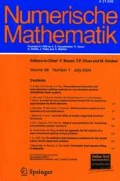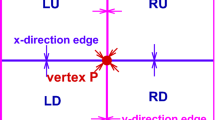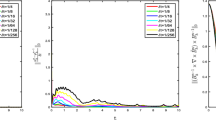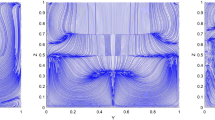Abstract
This paper is devoted to the design and analysis of some structure-preserving finite element schemes for the magnetohydrodynamics (MHD) system. The main feature of the method is that it naturally preserves the important Gauss’s law, namely \(\nabla \cdot \varvec{B}=0\). In contrast to most existing approaches that eliminate the electrical field variable \(\varvec{E}\) and give a direct discretization of the magnetic field, our new approach discretizes the electric field \(\varvec{E}\) by Nédélec type edge elements for \(H(\mathrm {curl})\), while the magnetic field \(\varvec{B}\) by Raviart–Thomas type face elements for \(H(\mathrm {div})\). As a result, the divergence-free condition on the magnetic field holds exactly on the discrete level. For this new finite element method, an energy stability estimate can be naturally established in an analogous way as in the continuous case. Furthermore, well-posedness is rigorously established in the paper for the Picard linearization of the fully nonlinear systems by using the Brezzi theory. This well-posedness naturally leads to robust (and optimal) preconditioners for the linearized systems.





Similar content being viewed by others
References
Armero, F., Simo, J.: Long-term dissipativity of time-stepping algorithms for an abstract evolution equation with applications to the incompressible MHD and Navier-Stokes equations. Comput. Methods Appl. Mech. Eng. 131, 41–90 (1996)
Arnold, D., Falk, R., Winther, R.: Finite element exterior calculus, homological techniques, and applications. Acta Numer. 15, 1 (2006)
Arnold, D., Falk, R., Winther, R.: Finite element exterior calculus: from Hodge theory to numerical stability. Bull. Am. Math. Soc. 47(2), 281–354 (2010)
Badia, S., Codina, R., Planas, R.: On an unconditionally convergent stabilized finite element approximation of resistive magnetohydrodynamics. J. Comput. Phys. 234, 399–416 (2013)
Balsara, D., Kim, J.: A comparison between divergence-cleaning and staggered-mesh formulations for numerical magnetohydrodynamics. Astrophys. J. 602, 1079–1090 (2004)
Balsara, D., Spicer, D.: A staggered mesh algorithm using high order Godunov fluxes to ensure solenoidal magnetic fields in magnetohydrodynamic simulations. J. Comput. Phys. 149, 270–292 (1999)
Bandaru, V., Boeck, T., Krasnov, D., Schumacher, J.: Numerical computation of liquid metal MHD duct flows at finite magnetic Reynolds number. pamir.sal.lv (1999)
Ba\(\breve{\rm n}\)as, L., Prohl, A.: Convergent finite element discretization of the multi-fluid nonstationary incompressible magnetohydrodynamics equations. Math. Comput. 79(272), 1957–1999 (2010)
Boffi, D., Brezzi, F., Fortin, M.: Mixed Finite Element Methods and Applications. Springer, Berlin (2013)
Bossavit, A.: Discretization of Electromagnetic Problems: The “Generalized Finite Differences” Approach. Handbook of Numerical Analysis, vol. XIII(04) (2005)
Brackbill, J.: Fluid modeling of magnetized plasmas. Space Plasma Simul. 42, 153–167 (1985)
Brackbill, J.U., Barnes, D.C.: The effect of nonzero \(\nabla \cdot B\) on the numerical solution of the magnetohydrodynamic equations. J. Comput. Phys. 430, 426–430 (1980)
Brezzi, F.: On the existence, uniqueness and approximation of saddle-point problems arising from Lagrangian multipliers. ESAIM. Math. Model. Numer. Anal. 8, 129–151 (1974)
Cai, W., Wu, J., Xin, J.: Divergence-free H(div)-conforming hierarchical bases for magnetohydrodynamics (MHD). Commun. Math. Stat. 1, 19–35 (2013)
Cockburn, B., Li, F., Shu, C.: Locally divergence-free discontinuous Galerkin methods for the Maxwell equations. J. Comput. Phys. 194(2), 588–610 (2004)
Conraths, H.: Eddy current and temperature simulation in thin moving metal strips. Int. J. Numer. Methods Eng. 39, 141–163 (1996)
Cyr, E., Shadid, J., Tuminaro, R., Pawlowski, R., Chacón, L.: A new approximate block factorization preconditioner for two-dimensional incompressible (reduced) resistive MHD. SIAM J. Sci. Comput. 35(3), 701–730 (2013)
Dai, W., Woodward, P.: On the divergence-free condition and conservation laws in numerical simulations for supersonic magnetohydrodynamic flows. Astrophys. J. 494(1) (1998)
Davidson, P.: An Introduction to Magnetohydrodynamics. Cambridge University Press, Cambridge (2001)
Dedner, A., Kemm, F., Kröner, D., Munz, C., Schnitzer, T., Wessenberg, M.: Hyperbolic divergence cleaning for the MHD equations. J. Comput. Phys. 175(2), 645–673 (2002)
Demkowicz, L., Vardapetyan, L.: Modeling of electromagnetic absorption/scattering problems using hp-adaptive finite elements. Comput. Methods Appl. Mech. Eng. 152, 103–124 (1998)
de Dios, B., Brezzi, F., Marini, L., Xu, J., Zikatanov, L.: A simple preconditioner for a discontinuous Galerkin method for the Stokes problem. J. Sci. Comput. 58(3), 517–547 (2014)
Elman, H., Howle, V., Shadid, J., Shuttleworth, R., Tuminaro, R.: Block preconditioners based on approximate commutators. SIAM J. Sci. Comput. 27, 1651–1668 (2006)
Evans, C., Hawley, J.: Simulation of magnetohydrodynamic flows—a constrained transport method. Astrophys. J. 332, 659–677 (1988)
Fey, M., Torrilhon, M.: A constrained transport upwind scheme for divergence-free advection. Hyperbolic Problems: Theory, Numerics, Applications, pp. 529–538 (2003)
Girault, V., Raviart, P.: Finite Element Methods for Navier–Stokes Equations: Theory and Algorithms. Springer, Berlin (1986)
Guermond, J.L., Minev, P.D.: Mixed finite element approximation of an MHD problem involving conducting and insulating regions: the 3D case. Numer. Methods Partial Differ. Equ. 19(6), 709–731 (2003). doi:10.1002/num.10067
Gunzburger, M., Meir, A., Peterson, J.: On the existence, uniqueness, and finite element approximation of solutions of the equations of stationary, incompressible magnetohydrodynamics. Math. Comput. 56(194), 523–563 (1991)
Helzel, C., Rossmanith, J.A., Taetz, B.: An unstaggered constrained transport method for the 3D ideal magnetohydrodynamic equations. J. Comput. Phys. 230, 3803–3829 (2011)
Hiptmair, R.: Finite elements in computational electromagnetism. Acta Numer. 11, 237–339 (2002)
Hiptmair, R.: Symmetric coupling for eddy current problems. SIAM J. Numer. Anal. 40(1), 41–65 (2002)
Hiptmair, R., Heumann, H., Mishra, S., Pagliantini, C.: Discretizing the advection of differential forms. In: ICERM Topical Workshop, Robust Discretization and Fast Solvers for Computable Multi-physics Models. ICERM (2014)
Jardin, S.: Computational Methods in Plasma Physics. CRC Press, Boca Raton (2010)
Li, F., Shu, C.: Locally divergence-free discontinuous Galerkin methods for MHD equations. J. Sci. Comput. 22(1–3), 413–442 (2005)
Li, F., Xu, L.: Arbitrary order exactly divergence-free central discontinuous Galerkin methods for ideal MHD equations. J. Comput. Phys. 231, 2655–2675 (2012)
Lin, P., Sala, M., Shadid, J., Tuminaro, R.: Performance of fully-coupled algebraic multilevel domain decomposition preconditioners for incompressible flow and transport. Int. J. Numer. Methods Eng. 67(9), 208–225 (2006)
Liu, C.: Energetic variational approaches in complex fluids. In: Multi-Scale Phenomena in Complex Fluids: Modeling, Analysis and Numerical Simulations. World Scientific Publishing Company, Singapore (2009)
Liu, J., Wang, W.: An energy-preserving MAC-Yee scheme for the incompressible MHD equation. J. Comput. Phys. 174(1), 12–37 (2001)
Liu, J., Wang, W.: Energy and helicity preserving schemes for hydro- and magnetohydro-dynamics flows with symmetry. J. Comput. Phys. 200, 8–33 (2004)
Logg, A., Mardal, K., Wells, G.: Automated Solution of Differential Equations by the Finite Element Method. Springer, Berlin (2012)
Londrillo, P., Zanna, L.: On the divergence-free condition in Godunov-type schemes for ideal magnetohydrodynamics: the upwind constrained transport method. J. Comput. Phys. 195, 17–48 (2004)
Ma, Y., Hu, K., Hu, X., Xu, J.: Robust preconditioners for the magnetohydrodynmaics models (2015). arXiv:1503.02553
Monk, P.: Finite Element Methods for Maxwell’s Equations. Oxford University Press, Oxford (2003)
Moreau, R.: Magnetohydrodynamics. Kluwer, Dordrecht (1990)
Nédélec, J.: Mixed finite elements in \(\mathbb{R}^{3}\). Numer. Math. 35, 315–341 (1980)
Nédélec, J.: A new family of mixed finite elements in \(\mathbb{R}^{3}\). Numer. Math. 50, 57–81 (1986)
Pekmen, B., Tezer-Sezgin, M.: DRBEM solution of incompressible MHD flow with magnetic potential. Comput. Model. Eng. Sci. 96(4), 275–292 (2013)
Phillips, E., Elman, H., Cyr, E., Shadid, J., Pawlowski, R.: A block preconditioner for an exact penalty formulation for stationary MHD. SIAM J. Sci. Comput. 36(6), 930–951 (2014)
Powell, K.: An approximate Riemann solver for magnetohydrodynamics. Upwind and High-Resolution Schemes, pp. 570–583 (1997)
Prohl, A.: Convergent finite element discretizations of the nonstationary incompressible magnetohydrodynamics system. Math. Model. Numer. Anal. 42, 1065–1087 (2008)
Raviart, P., Thomas, J.: A mixed finite element method for second order elliptic problems. Lecture Notes Math. 606, 292–315 (1977)
Rossmanith, J.A.: An unstaggered, high-resolution constrained transport method for magnetohydrodynamic flows. SIAM J. Sci. Comput. 28(5), 1766–1797 (2006)
Salah, N., Soulaimani, A., Habashi, W.: A finite element method for magnetohydrodynamics. Comput. Methods Appl. Mech. Eng. 190, 5867–5892 (2001)
Schötzau, D.: Mixed finite element methods for stationary incompressible magneto-hydrodynamics. Numer. Math. 96, 771–800 (2004)
Shadid, J., Cyr, E., Pawlowski, R., Tuminaro, R., Chacón, L., Lin, P.: Initial performance of fully-coupled AMG and approximate block factorization preconditioners for solution of implicit FE resistive MHD. In: Pereira, J., Sequeira, A. (eds.) V Europena Conference on Computational Fluid Dynamics, pp. 1–19 (2010)
Shadid, J., Pawlowski, R., Banks, J., Chacon, L., Lin, P., Tuminaro, R.: Towards a scalable fully-implicit fully-coupled resistive MHD formulation with stabilized FE methods. J. Comput. Phys. 229, 7649–7671 (2010)
Tóth, G.: The \(\nabla \cdot B= 0\) constraint in shock-capturing magnetohydrodynamics codes. J. Comput. Phys. 161, 605–652 (2000)
Tuminaro, R., Tong, C., Shadid, J., Devine, K.: On a multilevel preconditioning module for unstructured mesh Krylov solvers: two-level Schwarz. Commun. Numer. Methods Eng. 18, 383–389 (2002)
Wiedmer, M.: Finite element approximation for equations of magnetohydrodynamics. Math. Comput. 69, 83–101 (2000)
Xu, J.: Fast Auxiliary Space Preconditioning (FASP) Software Package. http://fasp.sourceforge.net/
Ye, X., Hall, C.A.: A discrete divergence-free basis for finite element methods. Numer. Algorithms 16, 365–380 (1997)
Yee, K.: Numerical solution of initial boundary value problems involving Maxwell’s equations in isotropic media. J. Comput. Phys. 14, 302 (1966)
Zhang, S.: Bases for C0-P1 divergence-free elements and for C1–P2 finite elements on union jack grids (2012). http://www.math.udel.edu/~szhang/research/p/uj.pdf
Acknowledgments
The authors would like to thank Long Chen, Xiaozhe Hu, Maximilian Metti, Shuo Zhang, Ludmil Zikatanov for useful discussions and suggestions. And the authors appreciate many valuable suggestions from the anonymous referees.
Author information
Authors and Affiliations
Corresponding author
Additional information
This material is based upon work supported in part by the US Department of Energy Office of Science, Office of Advanced Scientific Computing Research, Applied Mathematics program under Award Number DE-SC-0014400 and by Beijing International Center for Mathematical Research of Peking University, China.
Rights and permissions
About this article
Cite this article
Hu, K., Ma, Y. & Xu, J. Stable finite element methods preserving \(\nabla \cdot \varvec{B}=0\) exactly for MHD models. Numer. Math. 135, 371–396 (2017). https://doi.org/10.1007/s00211-016-0803-4
Received:
Revised:
Published:
Issue Date:
DOI: https://doi.org/10.1007/s00211-016-0803-4




